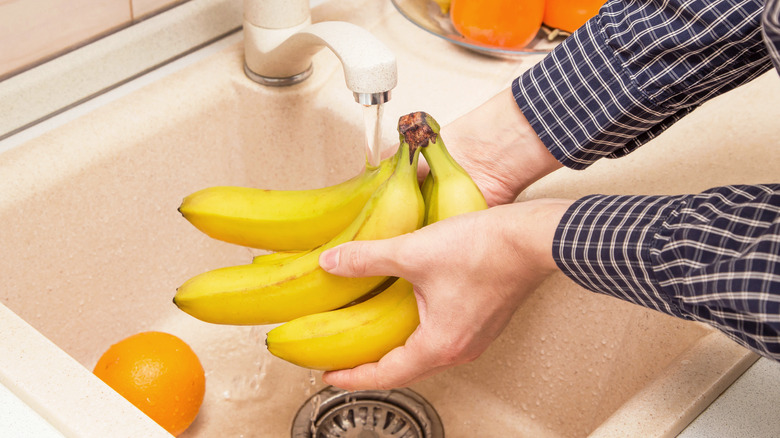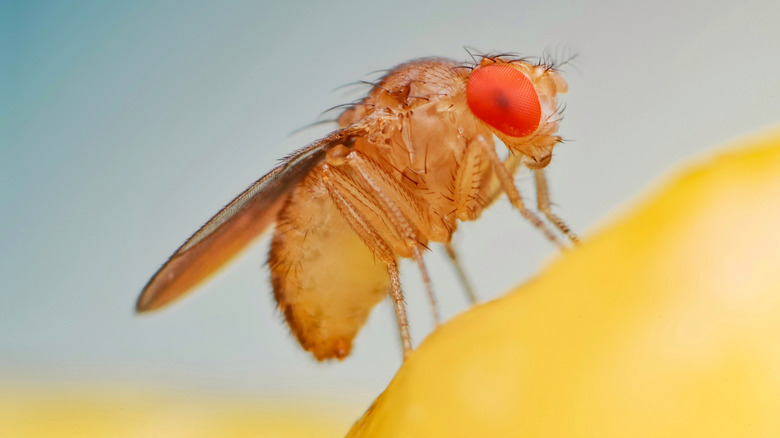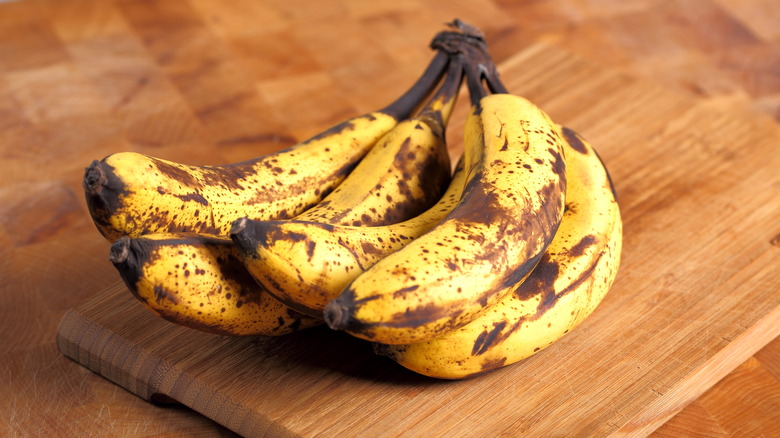Why You Should Always Wash Bananas (Even Though You Don't Eat The Peel)
There is everything to love about bananas. Not only are they a delicious, healthy fruit that's perfect for a quick snack that isn't going to leave your hands a sticky mess, but if you happen to forget about them until they're too ripe to eat, that's the perfect excuse to recycle them into your favorite chocolate chip banana bread. Here's a question, though: Do you wash your bananas when you bring them home? Probably not, right? You're not going to eat the peel, after all, so why bother?
The thing is, though, that you absolutely should — and it's not for the reason you're thinking. There's been a long-running debate on whether or not rinsing your fruits and veg removes all the pesticides that might be on their skin, but that's not what we're talking about here. The science might still be out on that, but science also says that there's a very good reason to wash those bananas.
Let's look at what Cornell University senior extension associate Jody Gangloff-Kaufman told Consumer Reports. The expert from the New York State integrated pest management program explained, "Fruit fly eggs are commonly introduced into a home by way of bananas." Fortunately, the solution is an easy one, with Gangloff-Kaufman adding, "Wash bananas when you first bring them home." And it's simple: Just rinse them under running water, or wipe them down with a cloth dipped in a vinegar and water mix. Now, let's talk about why.
What is it about bananas that makes them such a favorite of fruit flies?
Fruit flies might be some seriously annoying household pests, but they're actually pretty neat little creatures ... from a scientific point of view, at least. What most Americans call fruit flies are actually members of the Drosophilidae family, along with more than 4,000 other species. As for those bananas? They're not really interested in the fruit; they're attracted by what's growing on the fruit — and that happens to be things like bacteria, mold, and the yeasts that develop during ripening.
Bananas give off plenty of those, especially if they're brown, soft, overripe, and perfect for that three-ingredient banana bread you've been wanting to try. Fruit flies attracted by the delicious aromas of ripening bananas lay their eggs on the peel, sometimes long before you even bring them home. Unpack your groceries, put your bananas in the fruit bowl, and when the eggs hatch, it's game on for those fruit flies.
Within days, the first few fruit flies are making even more fruit flies, and here's some food for thought: A single female can lay around 100 eggs per day, and she can spend about a month doing that. That's one fruit fly potentially turning into an estimated 3,000 — so if you've ever wondered why you're suddenly overrun with little pests, there you have it. The good news is that a quick wash will go a long way in getting rid of the eggs before they start to hatch.
What if you're already battling a fruit fly infestation?
We've all been there: One day everything's fine, then we're fighting an infestation of fruit flies that seems like it came right out of some cheesy, 1970s-era horror movie. There are a few things you can do to keep fruit flies out of the kitchen, but the most important thing to remember is that it starts with prevention. In addition to washing your bananas, give other produce that's going to be sitting on the counter — like apples — a quick rinse. Get rid of any fruit that's starting to turn, and don't let scraps and compost sit around.
There are also a few ways to use their natural instinct against them. Take one of those pieces of overripe fruit, put it in a plastic container mostly sealed with plastic wrap. Add a few holes in the top, collect your fruit flies, then dispose of the container. You can also use other things in place of that fruit: A solution of red wine and dish soap will also attract them, as will a mix of vinegar, dish soap, and sugar.
Lastly, there are some great ways to stay proactive in the fight against fruit flies. Just like they're attracted to ripening and rotting fruit, they're repelled by other smells that most of us humans find quite lovely. Basil and lemongrass are both great fruit fly repellents, and so are lavender oil, peppermint, and clove. Who knew pest control could smell so good?


